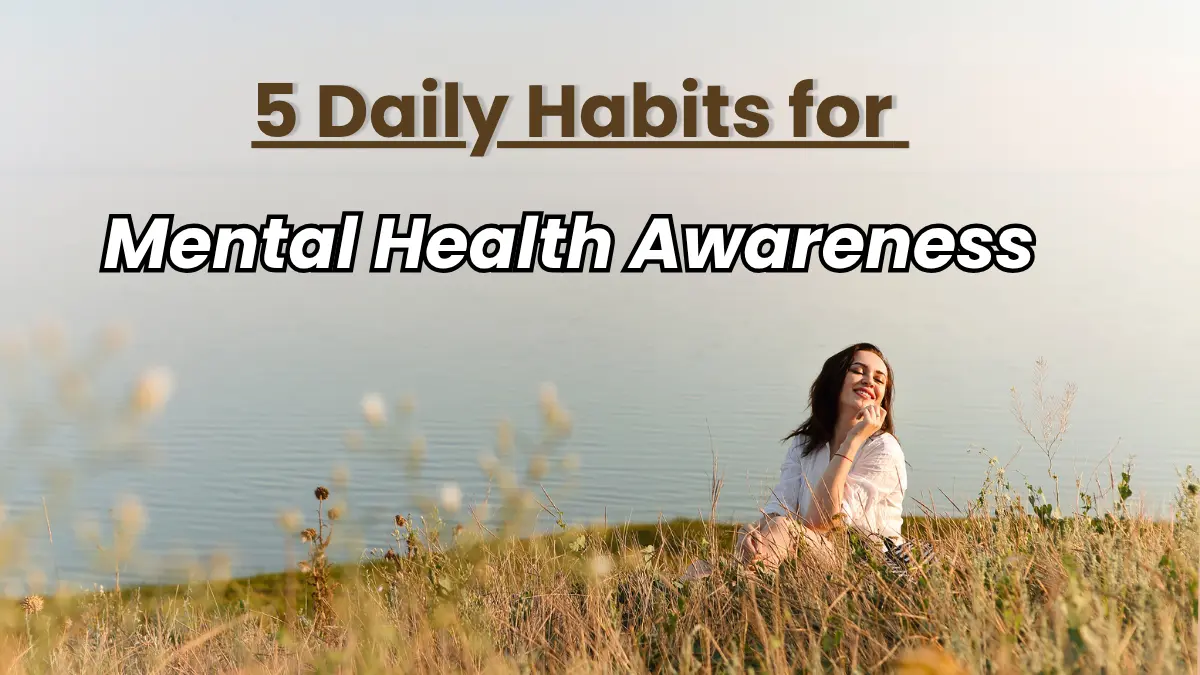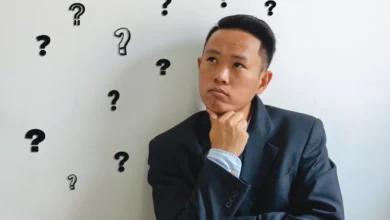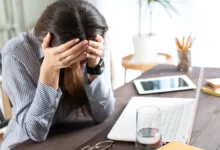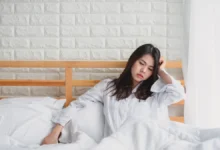Mental Health Awareness: 5 Daily Habits to Stay Mentally Healthy

Introduction: Mental Health It’s a Daily Essential
Let’s be honest—if we treated our mental health like we treat our phone battery, we’d be thriving. But most of us ignore the signs of burnout, stress, or anxiety until something really breaks down. That’s exactly why mental health awareness matters from the very first moment you wake up. But most of us ignore the signs of burnout, stress, or anxiety until something really breaks down.
That’s where mental health awareness comes in.This isn’t just a trend. Therapy rooms or awareness weeks don’t own it. True mental health awareness means tuning into your emotional and psychological needs—every single day.
Whether you’re a student overwhelmed by deadlines, a parent juggling too much, or someone simply trying to stay afloat, these five easy, practical habits can help bring calm to your chaos and clarity to your mind.
And no, you don’t need to meditate on a mountaintop or journal in perfect cursive. These are real-life tools for real-life minds.
1. Begin Your Morning With a Mind Check
How often do you wake up and actually ask yourself, “How am I feeling today?”
A simple 5-minute check-in each morning builds mental self-awareness. Before you reach for your phone, take a pause. Breathe. Tune into your thoughts.
Ask yourself:
- What’s my emotional state right now?
- Do I feel anxious, low, or calm?
- What can I do to support myself today?
By becoming aware of your internal state, you create space between stimulus and reaction. This isn’t just helpful—it’s empowering. It’s the first step toward real emotional well-being.
If you’re unsure where to begin, try a simple mood scale (1–10) or speak your thoughts aloud. It helps. And it trains your mind to notice patterns over time.
“You don’t have to control your thoughts. You just have to stop letting them control you.” — Dan Millman
2. Move Your Body to Reset Your Mind
Physical movement isn’t just good for your body—it directly supports your mental health awareness. In fact, you don’t need a gym membership, fancy gear, or an influencer’s morning routine to feel better.
A simple 10-20 minute walk can do wonders for your mood, clarity, and focus.
Here’s why:
- Movement boosts serotonin and endorphins—your brain’s happy chemicals
- It breaks the cycle of overthinking
- It helps release physical tension built from stress
Whether you stretch, walk, dance around your room, or chase your dog—it all counts. Physical activity doesn’t just benefit your body; it refreshes your mind health too.
Movement also gives you a break from screens and overstimulation, which your nervous system desperately craves.
“Exercise is like telling your brain: ‘I’m in control.”
3. Eat to Support Your Mental Wellness
We often forget that our brain is part of our body. What we eat impacts how we think, feel, and function.
Building a brain-friendly plate is one of the easiest ways to support your mental wellness.
Add these to your daily diet:
- Omega-3 fatty acids (found in fish, chia seeds, walnuts)
- Leafy greens (spinach, kale, etc.)
- Fermented foods (yogurt, kimchi) for gut-brain support
- Plenty of water (your brain loves hydration)
Limit caffeine and sugar if you’re prone to anxiety. That 3 p.m. sugar crash isn’t just physical—your mood dips too. Nourishing your body fuels your focus, balance, and resilience.
Try prepping snacks ahead of time—like nuts, fruit, or herbal tea—so you’re not reaching for chips or cola when stress hits.
4. Build Meaningful Connections (Not Just Online)
Another pillar of mental wellness is social connection. However, we’re more digitally connected than ever—yet more emotionally disconnected.
Likes don’t replace laughter. Stories don’t substitute support.
Studies show genuine connection is essential for strong psychological health. When we talk openly and feel heard, we experience lower stress, less anxiety, and stronger self-esteem.
So try this:
- Call a friend instead of texting
- Join a community group (even online, if needed)
- Express yourself honestly—with no filters
Being emotionally vulnerable creates trust—and that’s where real healing happens.
It’s okay if some people can’t hold space for your feelings. Find those who can. You deserve connection that fuels you, not drains you.
5. End Your Day With Reflection, Not a Netflix Marathon
We often end our days with noise—scrolling, shows, distractions.That’s why your brain needs stillness to process, reset, and restore.
Here’s how to wind down:
- Write down 3 things you’re grateful for
- Reflect on what went well today
- Acknowledge what felt hard without judgment
These small acts signal your brain: “It’s safe to rest now.” For example, gratitude especially improves sleep, lowers stress, and builds daily mental health awareness.
Remember, the way you end your day shapes how you begin the next.
Even five minutes of journaling or quiet time can help you release the day and enter rest more peacefully.
Limit Mental Clutter Throughout the Day
Just like a messy room creates stress, a cluttered mind does too. Mental clutter—racing thoughts, scattered focus, endless tabs—can wear you out more than any physical task.
Here’s how to keep your headspace clean:
- Take short breaks from screens every 90 minutes
- Practice box breathing (inhale 4 sec, hold 4, exhale 4, hold 4)
- Write out to-do lists to reduce brain fog
- Declutter one thought at a time—don’t over-process everything at once
While you can’t control every thought, you can reduce the chaos. And a clear mind is a powerful tool for long-term mental health awareness.
How to Track Your Mental Health Awareness Daily
Want to know if your habits are working? Start tracking your mental and emotional patterns—without obsessing.
Use a simple mood tracker app or a notebook. Record
- Your daily mood (1 to 10 scale)
- Energy levels
- Sleep quality
- Triggers and wins
This builds deeper mental health awareness over time. You’ll spot patterns, celebrate small wins, and notice what throws you off track. And the more informed you are, the better choices you can make.
Tracking helps you notice growth—even the slow kind. It reminds you that healing isn’t linear, and every step forward counts.
Final Thoughts: Protecting Your Peace is Power
Yet too often, breakdowns get our attention before we ever consider breakthroughs. That needs to change.
Mental health awareness means understanding your triggers before they explode. It means supporting yourself even when you feel “fine.” It means normalizing mental check-ins like we do physical ones.
These habits don’t make you weak. They make you wise.
Because when you care for your mind, you show up better—for work, for your people, and most importantly, for you.
Make your mental health a daily priority—not just a response to a crisis.
Start small. Stay consistent. Keep checking in.
Start today.










I don’t think the title of your article matches the content lol. Just kidding, mainly because I had some doubts after reading the article. https://accounts.binance.com/uk-UA/register-person?ref=XZNNWTW7
I don’t think the title of your article matches the content lol. Just kidding, mainly because I had some doubts after reading the article. https://accounts.binance.com/en/register-person?ref=JHQQKNKN
Thank you for your sharing. I am worried that I lack creative ideas. It is your article that makes me full of hope. Thank you. But, I have a question, can you help me? https://www.binance.info/hu/register?ref=IQY5TET4
Your article helped me a lot, is there any more related content? Thanks!
Keo188bet’s odds are pretty competitive, which is what I look for. I’ve used them a few times and haven’t had any problems so far. Always do your research. keo188bet
Your point of view caught my eye and was very interesting. Thanks. I have a question for you. https://www.binance.com/register?ref=IXBIAFVY
Thank you for your sharing. I am worried that I lack creative ideas. It is your article that makes me full of hope. Thank you. But, I have a question, can you help me? https://accounts.binance.com/register-person?ref=IHJUI7TF
Downloaded the Mexboxapp and it’s smooth. Easy to use and I can play on the go. This is a lifesaver when I’m away from my computer. Thumbs up! Check out the mexboxapp and see if you like it!
Trangchneu88, huh? That’s a mouthful! Gave it a spin and it’s alright. Kinda basic, but it worked fine on my phone. Worth a look if you’re bored, I guess. trangchneu88
Ph3655login, keeps what it promises, getting in isn’t a hassle! Had some spins on their slots. Nothing too crazy, but smooth enough. No major complaints. ph3655login
Thank you a lot for sharing this with all people you actually know what you are speaking about! Bookmarked. Please additionally discuss with my web site =). We will have a link alternate agreement between us!